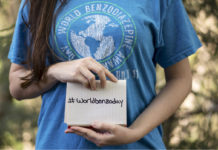World Benzodiazepine Awareness Day 2020
This week on MIA Radio, we present the second part of our podcast to join in the events for World Benzodiazepine Awareness Day 2020...
America’s Psychiatric Facilities Are ‘Incubators’ for COVID-19
As the novel coronavirus continues to wreak havoc around the globe, whistleblowers at American psychiatric facilities paint a picture of mismanaged COVID-19 responses and lax safety protocols, putting patients, workers, and the surrounding communities in harm’s way. Some even allege coverups of deaths.
And Now They Are Coming for the Unhoused: The Long Push to Expand Involuntary...
Mayor Adams' plan to "involuntarily remove" unhoused people has met with backlash from activists and the unhoused, who say it violates their rights and further entrenches systemic racism.
Veterans Find A Path to Healing Through Shakespeare
Veterans struggling with a diagnosis of PTSD, or depression and other difficulties find that learning to perform Shakespearean monologues, and developing their own dramatic monologues, can help them "unwire" from the traumas of war.
Busting the Deinstitutionalization Myth: We Actually Have More Beds Than Ever Before
New data upends common beliefs about asylum closures, deinstitutionalization, and rates of psychiatric coercion.
The Proactive Search for Mental Illnesses in Children
Part one of a two-part Mad In America investigation into the expansion of psychological screening and electronic surveillance of children and youth. A new government-funded mental health training program for British Columbia family physicians and school staff promotes screening for mental disorders in all children and youth. Critics say the program omits key scientific evidence, seems more like drug promotion than medical education, and downplays serious potential harms. Nevertheless, programs like it are rolling out across Canada and the US.
The Dying of the Light: Norway’s “Medication-Free” Services for Psychotic Patients Are Fading Away
Despite their successful outcomes, Norwegian non-coercive and medication-free programs are being threatened with closure.
Suicide Hotlines and the Impact of Non-Consensual Interventions
Those struggling with suicidal thoughts may stay silent instead of reaching out to suicide hotlines because they fear non-consensual intervention and the harmful impact of police involvement.
Fireside Project: Peer Support for Psychedelic Experiences
A new nonprofit support line takes a harm-reduction approach and helps people process their psychedelic experiences.
Mental Health Apps: AI Surveillance Enters Our World
While the developers are promoting the apps as a public health initiative, they are effectively an AI that would be snooping on you at all times—ostensibly coming to know you better than you know yourself. And ultimately doing so for commercial purposes that will expand the psychiatric enterprise.
Why Isn’t There a Popular Hashtag for Involuntary Commitment?
As uses of psychiatric force expand, can social media be better used to focus critical attention?
Exploding Myths About Schizophrenia: An Interview with Courtenay Harding
The Vermont Longitudinal Study, led by Courtenay Harding, belied conventional beliefs about schizophrenia by showing remarkably good outcomes for patients discharged in the 1950s and '60s.
A New York City Psychiatric Hospital Patient Said Staffers Illegally Restrained and Drugged Her;...
“No one is watching these hospitals,” Miranda warned. “No one is listening. Our rights are being violated left and right. They can do whatever they want.”
Life Inside America’s Psychiatric Facilities During the Pandemic: Eyewitness Accounts
Insiders paint a picture of chaos and fear in public and private psychiatric hospitals across the country. "Now that she has been discharged, Sevigny is getting the truth out, just as the nurse asked her to do. She also plans to continue to organizing in her state, with and on behalf of those who continue to be subjected to dangerous conditions in the name of care."
Bedlam: Public Media, Power, and the Fight for Narrative Justice
A new mental health documentary awakens longstanding tensions around voice, representation, and the power to define problems and solutions.
“Not Fragile”: Survivor-Led Mutual Aid Projects Flourish in a Time of Crisis
During the current pandemic, the practice of mutual aid—defined broadly as the ways that people join together to meet one another’s needs for survival and relationship—has become mainstream. Yet, often missing from major media coverage of mutual aid is any acknowledgment of its roots in movements led by marginalized people, including Black and Brown people, disabled people, mad people, and psychiatric survivors.
Making Music, Healing Souls
The healing power of communal singing is at the heart of two organizations in England and Ireland: Sing Your Heart Out and 49 North Street.
A New Paradigm for Testing Psychiatric Drugs Is Needed
This paper reviews the problems with the usual double-blind, placebo-controlled trials on which drug approvals are based, and advocates for a stricter form of testing psychiatric drugs with patient-relevant outcomes, real comparators, long-term outcomes, and assessment of harms.
Inner Fire: Where Seekers Have a Choice
A Vermont residential community program helps people taper or stay off medications with holistic care embedded in a pastoral setting.
Screening for Bipolar: Have You Ever Been “Unusually Happy” for More than a Week?
A new questionnaire funded by AbbVie conflates antidepressant side effects with bipolar disorder and doesn’t actually meet the criteria for being considered “screening.”
Mutual Support in an Age of Social Distancing
Connection, whether one-on-one or in groups, is at the heart of peer support. In a time when social distancing and stay-at-home orders proliferate, the Western Massachusetts Recovery Learning Community/Wildflower Alliance (WMRLC) is finding creative ways to adapt to rapidly changing circumstances dictated by the novel coronavirus.
Voting While “Mentally Ill”: A Legacy of Discrimination
Legal and practical barriers to voting disenfranchise people judged "mentally incompetent." The centuries-old, unclear laws and regulations also disproportionately affect people of color.
The Lessons of Music: Nurturing Mental Health in Cultures Around the Globe
Music is an ancient and omnipresent tool for wellness, a carrier of peace for individuals, and a bonding agent for communities throughout history and the world.
From Compliance to Activism: A Mother’s Journey
Through years of turmoil and confusion, Cindi Fisher’s enduring love for her involuntarily committed son gradually changed her from compliant mom to mental health civil rights activist. That’s when authorities banned her from even contacting her son. But could she be a bellwether of a coming nation-wide wave of protestors?
An Open Letter to VA Secretary Robert Wilkie: A Plan for Deprescribing Veteran Suicides
Through my research and experiences, I've found that what the Veterans Administration has been doing to fight the veteran suicide epidemic isn't working and appears to be unintentionally exacerbating it. These problems are fixable. But I need your help.

































